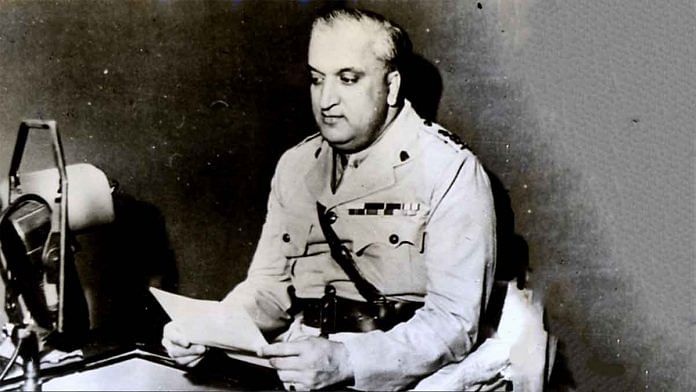New Delhi: It has been six decades since the death of Maharaja Hari Singh of Jammu and Kashmir, the man who signed the treaty of accession with India, but there are certain aspects of his public life, which haven’t been discussed much, thereby promoting certain stereotypes by him.
With no love lost between him and the Abdullahs of the National Conference (NC), the Maharaja, contrary to the reality, wasn’t projected as a patriot.
The fact though is that he always wanted his state to accede to India and shunned several Pakistani efforts to compel him to be part of Pakistan or not be part of India.
Justice Mehr Chand Mahajan, who took over as Prime Minister of Jammu and Kashmir on 15 October 1947 on request of the then Home Minister Sardar Vallabhbhai Patel, has recalled in his autobiography, Looking Back, the patriotism and pro-India feelings of the Maharaja.
Incidentally, Mahajan was granted eight months of leave from the then Punjab High Court to be appointed as the PM of Jammu and Kashmir. He later went on to become the Chief Justice of India.
“Prior to my taking over as Prime Minister, Mr (Mohammad Ali) Jinnah had on three occasions made attempts to come to Srinagar and stay there, ostensibly for reasons of health,” Mahajan has written in Looking Back.
“He had sent his military secretary, a Britisher, twice with a personal letter to Maharaja with the request that as advised by his physicians he should be allowed to visit the valley. He was willing to come as a private citizen and to make his own arrangement for his stay,” the book reads.
“The Maharaja suspected that the object of his visit to Srinagar was to coerce him so as to secure Kashmir’s accession to Pakistan, to take possession of the state and to celebrate Id there as the Governor General of Pakistan, including Kashmir,” Justice Mahajan added.
“The Maharaja sent a polite refusal to all his respects emphasizing the fact that he being the Governor General of Pakistan could only visit the state if due arrangements could be made for his stay there by the state government according to his status as head of a neighbouring state, and if proper security arrangements were possible. This, the Maharaja said, he was not able to do in the circumstances that had arisen.”
Also read: This Navreh, RSS-backed J&K body launches campaign to get Kashmiri Hindus back to Valley
‘Maharaja was vital to J&K ceding to India’
According to Mahajan, “if the Maharaja had not turned down the request, Jinnah would have somehow created a situation in Kashmir leading to its accession to Pakistan”.
“Mr Jinnah had openly proclaimed that legally speaking the question of accession depended entirely on the choice of the ruler and the people of state had no right to question his choice,” he added in the book. “The Maharaja was being constantly told that he was an independent sovereign, that he needed not consult anybody in the matter of accession of the State….. After accession to Pakistan, he could continue to be an absolute ruler of the state.”
Justice Mahajan also made an interesting observation about Sheikh Abdullah, who was considered to be close to the then Prime Minister Jawaharlal Nehru and a major reason for strained relationship between Nehru and Maharaja Hari Singh.
“…my first good look at Sheikh Abdullah and my impression was that he was out to gain power at any cost. To acquire it he would try to influence his friend, the Prime Minister of India…”
And that is what happened too. Nehru’s insistence on handing over the reins of the Jammu and Kashmir administration to Sheikh Abdullah was one of the key reasons for Maharaja Hari Singh delaying signing the instrument of accession.
Golwalkar’s role
It is also said that the second sarsanghchalak of the Rashtriya Swayamsevak Sangh (RSS), M.S. Golwalkar, popularly known as ‘Guruji’, played an important role in convincing the Maharaja to sign the instrument of accession.
Golwalkar had reached Srinagar by air from Delhi on 17 October 1947. The meeting between him and Maharaja Hari Singh took place on the morning of 18 October when Guruji convinced Maharaja to integrate his state with India without any further delay.
Former bureaucrat and close aide of Sonia Gandhi during UPA’s regime, Arun Bhatnagar, has also mentioned this incident in his book India: Shedding the Past, Embracing the Future, 1906-2017.
Bhatnagar, a 1966-batch IAS officer, has written that Guruji went to meet Maharaja Hari Singh after he was urged by Sardar Patel to take up this matter.
Madhavrao Mule, who was the RSS’ prant pracharak (full-time worker and in-charge) of Jammu and Kashmir and Punjab at that time has also explained this incident in detail in his book Sri Guruji Samagra Darshan.
(The writer is research director with the Delhi-based think-tank Vichar Vinimay Kendra. He has authored two books on the RSS. Views expressed are personal)
Also read: These are the 6 festivals RSS celebrates and the significance behind them




gosh ,next, RSS will claim they sent the indian army to kashmir